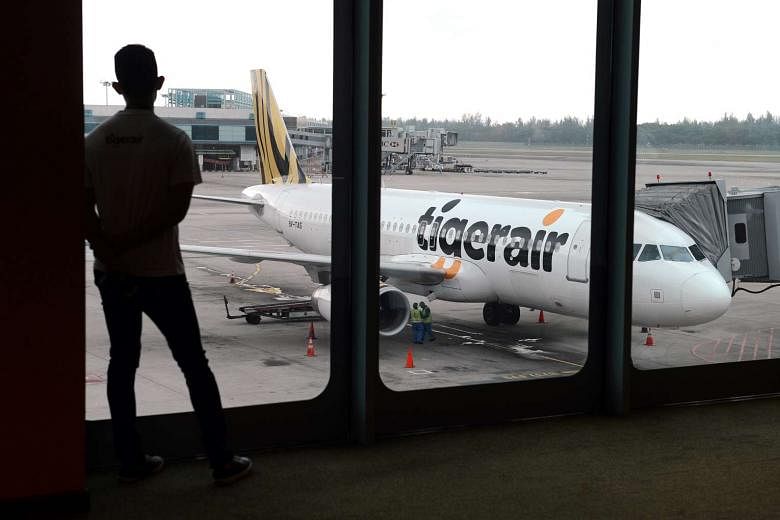SINGAPORE (BLOOMBERG) - The move by Singapore Airlines to take back budget carrier Tigerair which it floated less than six years ago is a tactically well-timed move, says one analyst.
SIA, which owns 55.8 per cent of Tiger Airways Holdings Ltd., is offering to pay S$0.41 in cash for each share, the carriers said in a joint statement on Friday morning (Nov 6). While that's a 32 per cent premium to Thursday's close, it's well below the S$1.50 per share investors paid in Tigerair's initial public offering in January 2010.
Tigerair shareholders also will have the option of buying SIA shares at S$11.1043 each, a 0.4 per cent discount to Thursday's close.
SIA plans to delist Tigerair.
Rising incomes in Asia are enabling more people to fly for the first time, sparking rapid expansion of budget carriers. But while the Asia-Pacific region remains the most promising for travel growth, with a third of Airbus and Boeing orders, the jet-buying frenzy of the last five years may give way to a more sober approach as carriers adjust to the challenges of mounting competition and inadequate infrastructure. Tiger has posted losses in five of the past six quarters.
"This a tactically well-timed move for Singapore Air," Mr Alan Richardson, a Hong Kong-based money manager at Samsung Asset Management Ltd, said in an e-mail. "Tigerair has been restructuring operations by cancelling loss-making routes. By doing, so earnings are at an inflection point."
SIA injected funds into Tigerair last year by increasing its stake to help the budget carrier. The low-cost carrier has been reducing its capacity, cutting routes and ending partnerships in Indonesia and the Philippines to improve its financials.
SIA shares have fallen 3.9 per cent this year, while Tigerair climbed 17 per cent. The Singapore benchmark Straits Times Index lost 10 per cent. Both stocks were halted from trading on Friday for the announcement.
SIA on Thursday posted profit that more than doubled after adding Tigerair's earnings into its own account in the July-September period. Net income for the SIA group jumped to S$213.6 million in the quarter ended September, from S$90.9 million a year earlier.
Tigerair has been making efforts to return to profit. The company reported a loss of S$12.8 million in the three months ended September, compared with a S$182.4 million loss a year earlier. Yields, or money earned from carrying travelers each kilometer, rose 8.2 per cent to 6.6 cents, and it filled 84.12 percent of its seats in the quarter.
"Our investment in Tiger provides the SIA Group an additional engine of growth in an expanding segment of the air travel market," SIA chief executive officer Goh Choon Phong said in a letter to staff on Friday. "This ultimately strengthens the SIA Group as it enables us to tap into market segments that would not otherwise be available to us."
The restructuring is symptomatic of the challenges budget airlines face in South and South-east Asia, where most carriers are unable to take advantage of rising traffic because of low fares and capital expenditures to buy new aircraft.
SIA also has another budget airline, Scoot. Low-fare airlines account for more than 50 per cent of seats sold in Singapore.
SIA has been enhancing cooperation between its two budget units. Members of SIA's mileage programme, KrisFlyer, can earn miles when they fly on Scoot and Tigerair. The two budget carriers are also offering passengers seats on each other's planes to increase efficiency. SIA offers flights to regional destinations through its SilkAir subsidiary.
"It makes complete sense for Tigerair to be a 100 per cent owned subsidiary of Singapore Airlines," said Mr Timothy Ross, a Singapore-based analyst at Credit Suisse Group. "I can see a number of unexhausted areas of synergies."

